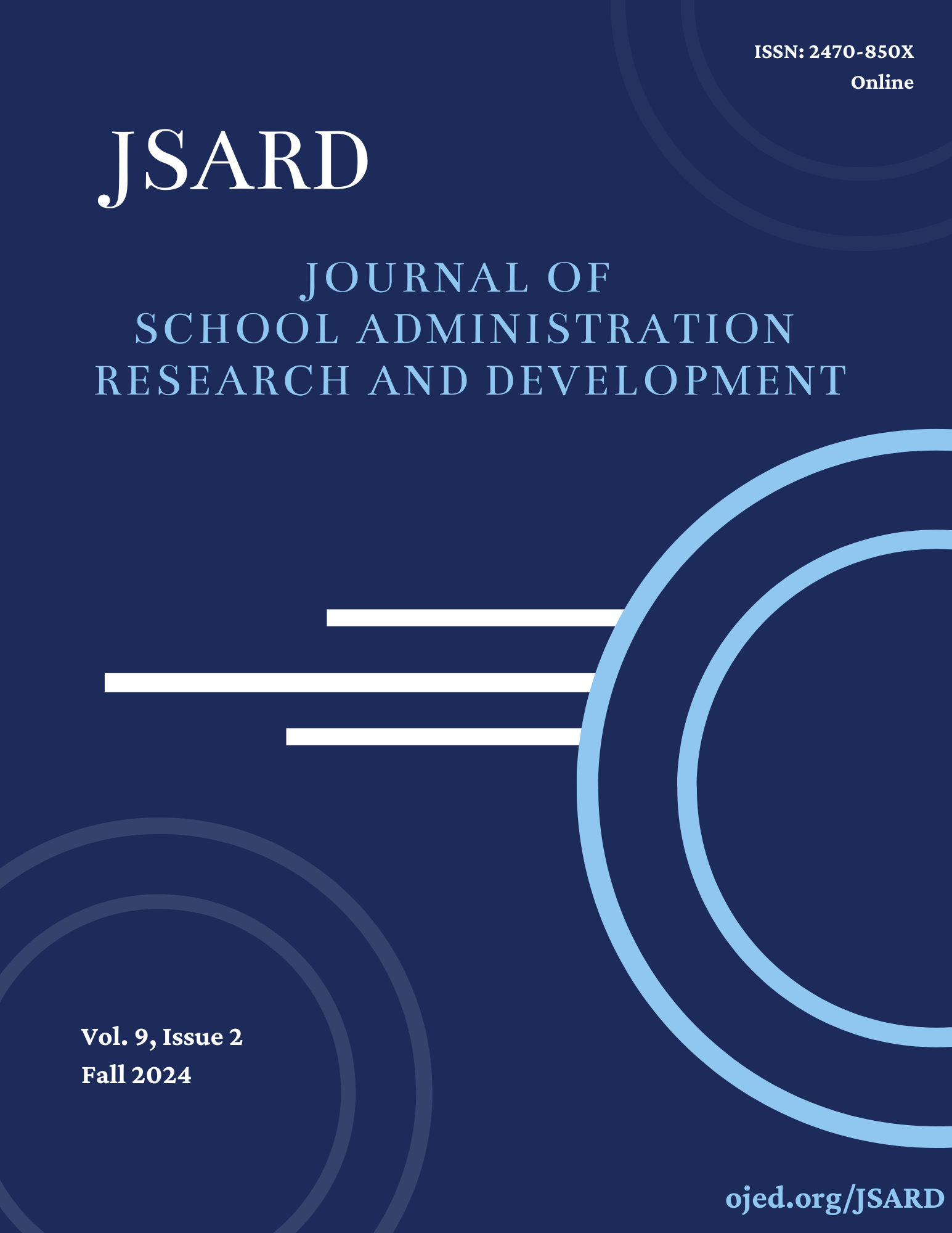Mentoring Relationships Within a School-based Environment
DOI:
https://doi.org/10.32674/yc4vh480Keywords:
Mentor, Mentoring, Mentee, Survey Design, student mentoring, school-based mentoringAbstract
Past research examining mentoring programs has explained the benefits that student mentees received from having an adult as a mentor. For the mentee, studies indicate that mentoring relationships positively influence academic performance, social attitudes, communication abilities, and career aspirations. However, there has been very little research from the perspective of the mentor regarding their experiences of being in a mentoring relationship. This study builds upon Berning’s (2013) research that extracted the thoughts and opinions of retiree and teen mentors who worked with elementary students. The Berning report recommended that further research study adults involved in the workplace who spent their off time serving as mentors. This study addresses this gap by surveying 69 adult business professionals mentoring high school students in San Antonio, Texas. The survey revealed four central themes: 1) both mentors and mentees require high motivation for a successful relationship, with mentors often motivated by personal fulfillment; 2) mentors are driven by a commitment to give back to the community despite most lacking prior mentoring experience; 3) there is significant interest in mentor training to enhance program effectiveness; and 4) mentors generally enjoy the program, showing high willingness to continue, inclination to recommend it, and satisfaction with a monthly meeting schedule. Successful mentors are active listeners who engage their mentees by setting clear, aligned goals, while gaining the added benefits of enhanced communication and leadership skills through their mentoring roles.
Downloads
References
Batson, C., Ahmad, N., & Tsang, J.A. (2002). Four motives for community involvement. Journal of Social Issues, 58(3), 429-445. https://doi.org/10.1111/1540-4560.00269
Berning, A. (2013). A qualitative study of the motivating factors, perceptions, and experiences of mentors involved with elementary students during in-school and after-school programs (Master’s thesis), https://digitalcommons.cedarville.edu/education_theses/59/
Creswell, J.W. (2012). Educational research: Planning, conducting and evaluating quantitative and qualitative research. London, England: Pearson.
DuBois, D.L., Holloway, B. E., Valentine, J. C. & Cooper, H. (2002). Effectiveness of mentoring programs for youth: A meta-analytic review. American Journal of Community Psychology, 30(2), 157-197. https://doi.org/10.1023/A:1014628810714
DuBois, D. L., & Neville, H. A. (1997). Youth mentoring: Investigation of relationship characteristics and perceived benefits. Journal of Community Psychology, 25(3), 227-234. https://doi.org/10.1002/(SICI)1520-6629(199705)25:3<227::AID-JCOP1>3.0.CO;2-T
Eby, L.T., Allen, T.D., Evans, S.C., Ng,T., & Dubois, D. (2008). Does mentoring matter? A multidisciplinary meta-analysis comparing mentored and non-mentored individuals. Journal of Vocational Behavior, 72(2), 254-267. https://doi.org/10.1016/j.jvb.2007.04.005
Eller L., Lev E., & Feurer A. (2014). Key components of an effective mentoring relationship: A qualitative study. Nurse Education Today, 34(5), 815-820. https://doi.org/10.1016/j.nedt.2013.07.020
Grossman, J., & Rhodes, J. (2002). The test of time: Predictors and effects of duration in youth mentoring relationships. American Journal of Community Psychology, 30(2), 199-219. https://doi.org/10.1023/A:1014680827552
Herrera, C., Grossman, J. B., Kauh, T. J., & McMaken, J. (2011). Mentoring in schools: An impact study of big brothers big sisters school-based mentoring. Child Development, 82(1), 346-361. https://doi.org/10.1111/j.1467-8624.2010.01559.x
Hancock, K. (2003). The case for in-school monitoring. Education Canada, 43(1), 24-25. https://eric.ed.gov/?id=EJ661645
Hodkinson, P. (2005). “Insider research” in the study of youth cultures. Journal of Youth Studies, 8(2), 131-149. https://doi.org/10.1080/13676260500149238
Meier, S., & Stutzer, A. (2008). Is volunteering rewarding in itself? Economica, 75(297), 39-59. https://doi.org/10.1111/j.1468-0335.2007.00597.x
Nulty, D. (2008). The adequacy of response rates to online and paper surveys: What can be done? Assessment & Evaluation in Higher Education, 33(3), 301-314. https://doi.org/10.1080/02602930701293231
O’Donnell, J., Michalak, E.A., & Ames, E.B. (1997). Inner-city youths helping children: After-School programs to promote bonding and reduce risk. Children & Schools, 19(4), 231-241. https://doi.org/10.1093/cs/19.4.231
Philip, K., & Hendry, L. B. (2000). Making sense of mentoring or mentoring making sense? Reflections on the mentoring process by adult mentors with young people. Journal of Community and Applied Social Psychology, 10(3), 211-223. https://doi.org/10.1002/1099-1298(200005/06)10:3%3C211::aid-casp569%3E3.0.co;2-s
Plows, A. (2008). Social movements and ethnographic methodologies: An analysis using case study examples. Sociology Compass, 2(5), 1523-1538. https://compass.onlinelibrary.wiley.com/doi/10.1111/j.1751-9020.2008.00091.x
Rhodes, J. (2013). Fostering close and effective relationships in youth mentoring programs. Research in Action, 4, 3–7. https://files.eric.ed.gov/fulltext/ED502222.pdf
Sipe, C. L. (1999). Mentoring adolescents: What we have learned. In J. B. Grossman (Ed.) Contemporary Issues in Mentoring (pp. 10-23). Philadelphia: Public/Private Ventures. https://www.princeton.edu/~jgrossma/reports/contemporary%20issues1.pdf
Snyder, M., Clary, E. G., & Stukas, A. A. (2000). The functional approach to volunteerism. In G. R. Maio, & J. M. Olson (Eds.), Why we evaluate: Functions of attitudes (pp. 365-393). Mahwah, NJ: Erlbaum. https://psycnet.apa.org/record/1999-04353-013
Straus, S., Johnson, M.O., Marquez, C., & Feldman, M. D. (2013). Characteristics of successful and failed mentoring relationships: A qualitative study across two academic health centers. Academic Medicine, 88(1), 82-89. https://doi.org/10.1097/ACM.0b013e31827647a0
Watt, S., Simpson, C., McKillop, C., & Nunn, V. (2002). Electronic course surveys: does automating feedback and reporting give better results? Assessment & Evaluation in Higher Education, 27(4), 325-337. https://doi.org/10.1080/0260293022000001346
Downloads
Published
Issue
Section
License
Copyright (c) 2024 Journal of School Administration Research and Development

This work is licensed under a Creative Commons Attribution-NonCommercial-NoDerivatives 4.0 International License.
All published articles are licensed under a Creative Commons Attribution-NonCommercial-NoDerivs 4.0 Unported License.


.png)
